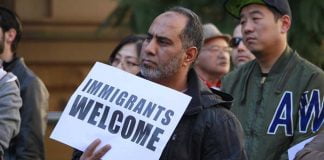OVER 200 people from around Australia travelled to join hundreds more from the NT in a protest convergence against the NT intervention in Mparntwe-Alice Springs from September 29 to October 3. Activists camped at the “prescribed area” Mt Nancy town camp, in solidarity with all targeted Aboriginal communities.
Prescribed Area Alliance
The convergence opened on Monday September 29 with a meeting of people from “prescribed areas” coming together in an historic alliance against the intervention.
More than 100 representatives joined this meeting, traveling from as far as Lajamanu (900 kilometres from Alice Springs) and Darwin.
Most of the day was taken up with passionate speeches, in many different languages, describing the deep pain inflicted on communities. Consistent themes were the experience of racism and the enormous pressure being put on cultural practices, family life and ability to live on country. Other speakers focused on the need for action, and a return to the strategies of mass mobilisation seen during the fight for land rights.
Women from “prescribed areas” put together a document calling for an end to the intervention which included the statement: “There’s no new houses, schools or anything for communities. They’ve only built new houses for the new intervention staff. We had programs created by the community for our community. We wanted more support for them. Community programs have been taken away. They’ve taken away our night patrol, community bus and women’s centres”.
March to “Close the Gap”
A rally and march through Alice Springs was held on Tuesday September 30, the biggest protest against the intervention yet in the NT. Participants marched almost three kilometres in 37-degree heat to “The Gap”, where the Stuart Highway passes through a rock formation with important cultural significance.
Police attempts to stop a march through The Gap were defied and traffic was stopped by convergence vehicles traveling in convoy. This was designed to send a clear message to government that any genuine attempt to “close the gap” between Aboriginal and non-Aboriginal Australia will require scrapping the intervention’s approach and empowering communities.
“Listening Tour”
From Wednesday October 1, interstate supporters visited a number of communities in and around Alice Springs to learn more about the impact of the intervention.
I travelled with 30 people who visited Yuendumu, 300 kilometres to the west. The visit began with an “intervention tour”, conducted by long time resident Frank Baarda.
We were shown a number of expensive construction projects completed since the intervention began, none of them with any local labour or consultation. A government business manager’s house is surrounded by barbed wire and perpetually empty, and $200,000 has been spent on a barbed wire fence around the small rubbish tip five kilometres out of town. Three demountable structures resembling prison cells have also been placed in the middle of town and ringed by barbed wire, as a “men’s refuge”.
Local resident Susie Bady commented, “this shows you what the intervention thinks of Aboriginal men”. A successful domestic violence program Susie established in Yuendumu was shut down last year after she went on maternity leave, because no accommodation had been built for the replacement worker.
On Wednesday night 50 local people turned out to a hastily organised meeting on the basketball courts to share the experience of the fight put up by the community, in both Warlpiri and English.
Yuendumu held off welfare quarantining for over six months and also retained Community Development Employment Projects, by refusing to co-operate with the government. Successful local services, such as the “Old People’s Program”, have been defended from government takeover by community members confronting bureaucrats and demanding they leave town.
The militancy of Yuendumu locals is a result of their clear understanding of the agenda behind the intervention. One meeting participant told us, “It’s not that the intervention isn’t working. They’re doing this on purpose. They want to chop us up and throw us in the fire”.
Another, Mr Nelson stated, “This is a White Australia policy. They need to push our culture down to justify the legitimacy of government and their claims to land”.
The campaign network, both amongst “prescribed area” people and nationally, has grown much stronger through the convergence. Already, there are reportback meetings being organised in affected communities and major cities around the country. Plans are developing for a national day of action around human rights day on December 13 and discussion is beginning about a convergence on Canberra for the opening of parliament next year.
By Paddy Gibson




